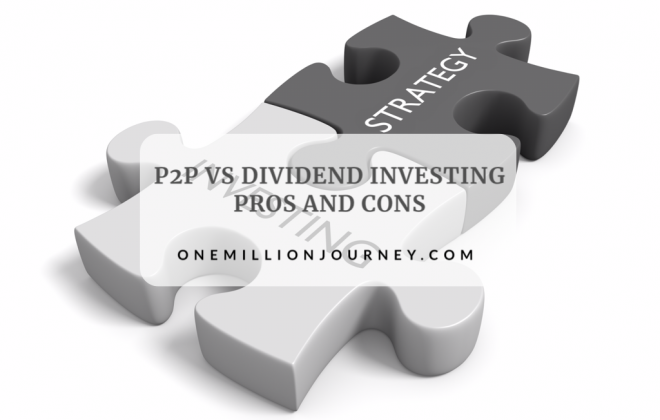My little British Investing Empire as an Expat
In the next lines, I would like to describe what I call my British Investing Empire strategy as an expat and how I am planning to build it up (or down!). For British people, this strategy is nothing special as the main idea is just investing through tax-free accounts like an ISA (Individual Savings Account), but for expats, it could be an eye-opener and a strategy worth mentioning and considering whether you plan to live in the UK for a long period of time or not.
Table of Contents
ISA tax-free investments
UK residents who want to save and invest are somehow lucky when compared with other European countries. The main reason? Taxes! UK government tries to encourage its people to save and invest by offering investments with tax advantages. There are several options to choose from, but the one I am going to talk about is the one I have ‘Stocks and Shares ISA’ specifically with Vanguard. There is a maximum amount you can save every tax year (from April to April), currently being £20,000. That means you can add 20K per year in your savings or investment account and buy, hold or sell whatever you want to invest to (Individual stocks, Index funds, ETFs, Bonds Funds, Property shares, Peer-to-Peer lending, …). The best of all, you won’t have to pay any taxes on the returns of your investments, pretty cool, right? Europe should take note of that and start learning. If this is something new to you, keep reading and head over this page to find out more about what possibilities this country is offering you to become wealthier.
Can an expat join the ISA tax-free league?
If you are an expat living in the UK, you can enjoy this benefit by just being a resident. In fact, the only thing you need is a British bank account older than 3 months and a proof of residence. You can add funds to your ISA as long as you reside in the UK. Once you move overseas you won’t be able to add more funds, but you can still keep your ISA account open and its investments within. This is the part I like. Although you may be living somewhere else, you can keep you British seed working for you – tax efficiently. Marvellous! 🙂
As every investing strategy, there are some risks. The main one is the value of the Pound sterling. If its valuation goes down when you need to withdraw money then you will lose some however, I believe the Pound will remain strong over the long-term view, besides all the noise around Brexit. Another drawback is that you won’t be able to apply the dollar-cost averaging strategy after living in the UK. In order to minimise this risk, I always hold bonds in my portfolio, which will generate passive income and free cash which can be used to dollar-average my investments in the future.
What about after leaving the UK?
After leaving the UK you won’t be able to add any funds to your investments but can keep them open and running. This is a question I raised to Vanguard prior to begin, their answer was clear – the only requirements are keeping a UK bank account operative to withdraw money from your ISA account and a UK mobile phone number to validate operations. Besides that, you are free to live wherever you want to – let’s go an travel the world! 🙂
My little British Investing Empire
Because of my personal situation, it’s somehow challenging to set a plan. I will do my best to analyse the main scenarios and how they could impact the value of my British investments. The investments I consider within my British InvestingEempire are my Vanguard ISA and my property shares within Property Partner.
As I don’t know how long I will stay in the UK, I am going to assume that I will leave by December 2019 and contribute £500 per month until then. If it turns out to be that I will stay for a longer period, then I will update the plan accordingly.
Vanguard ISA
My investing strategy
Vanguard has a large variety of investment options around the globe (USA, Europe, UK, Japan or emerging markets). Besides its well-known Lifestrategy or Target Retirement funds, it offers Index funds, ETFs, Bond Funds and even some active funds. UK investors don’t have access to the full list of Vanguard funds, for instance, I can’t buy any REIT ETF, so if I want to diversify my portfolio owning some UK Real Estate, I must use a different vehicle. This is where Property Partner or property crowdfunding platforms come in.
My investing strategy in Vanguard is simple, I keep a balanced Stocks/Bonds Portfolio. Taking that I am only 33 years old, this strategy seems very conservative. Financial advisors would recommend me to hold a larger proportion of stocks to build up value quicker. That sounds perfect to someone who plans to contribute monthly deposits for long periods of time, but this is not my case, as I won’t have the option of adding any more funds after leaving the island. This is the reason why I prefer to take this conservative approach, so in a market crash scenario my fixed income streams from bonds will partially protect me. Also, I believe we are now approaching the end of a bull market cycle, approaching the distribution phase . Once we are on the other side of the cycle, then I will reconsider to increase my portion in stocks.
My holdings are almost all US based. I know, it sounds funny! I use a UK Vanguard account to actually invest in the US using Dollars. Most of the investing books I have read are from American authors influencing some of my investing decisions. America is still the biggest economy in the world and its Dollar the primary world currency.
I hold my stocks through two ETFs:
- The Global Value Factor (VVAL): This is an actively-managed fund holding more than 1200 undervalued stocks – have lower prices relative to their fundamental measures of value. Its price-earnings ratio is 9x (compared to 15.6x for the FTSE Developed All Cap Index) and a price/book ratio of 1x (compared to 2.1x for the FTSE Developed All Cap Index). I am a big fan of Benjamin Graham and his value investing strategy, this fund particularly follows some of his rules.
- S&P500 (VUSA): The best 500 US companies and the most recommended index to own according to successful investors like Warren Buffet, Charlie Munger, Jason Zweig and John C. Bogle (rest in peace), to name a few.
On the other half, I hold USD Corporate and Treasury bond funds. Detailed holdings screenshot here.
What returns can I expect?
According to what John C.Bogle wrote on the last edition of his book “The little book of common sense investing” in December 2017, the returns expected for the next 10 years are not very promising. He thinks that for those holding a stock/bond balanced portfolio – the type I hold – will get a 3.6% annual average return. This is the return I am going to use in my calculations for the next 9 years, but since I plan to hold on this strategy for the next 32 years (at age 65), I am going to apply the historical long-term average of 7%, after the prior 9 years. I don’t know if this value is optimistic or conservative, but at least I think it can help me to have a rough idea of how much my British investments could grow and use it as a reference.
Let’s get my favourite compound interest calculator and get to the numbers:
The value of my ISA was £26487 by the end of January 2019
Adding £500 per month until December adds £5.5K
Adding a 3.6% return, the account value by the end of 2019 (when I hypothetically leave the UK) should be something close to £33K. After this, there won’t be any monthly deposit contributions anymore.
For the next 8 year and assuming a 3.6% return without monthly contributions the value should be £44K.
I still got 25 years to go before turning 65 (2051) and assume a 7% yearly return from now on. My account should weight…
… £237K.
This is the value I can expect after all these years. It’s not too bad for just 5 years of working, saving and investing money in the UK, to actually buy tax-free investments from the US!
Applying the 4% rule it should theoretically be safe enough to withdraw £790 monthly after 2051. Unfortunately, this investment alone won’t be enough for me to retire in 32 years but will add a welcoming extra.
Property Shares (Property Partner)
My investments in property shares with Property Partner are also a part of my British empire. Even though I probably won’t benefit from any tax advantages here, it can still add a good amount to my retirement fixed income.
Here are the statistics I am going to use for my calculations.
- According to Monevator, the historical house price growth average in the UK is 2.9% yearly from 1975 to 2011. This value is close to the 3.2% capital growth value that Property Partner states on its website. As an average, I take a 3% for my calculations.
- I have found several sources stating different historical rental yields, the average yields vary from 3.5% to 4.5%, so I will take the average of 4% that also matches the Property Partner one.
- The total annual return I can expect in my Property Partner account is 7%.
- I assume I won’t add any more funds during the investing period.
Time to take the calculator to run the numbers;
My account value by the end of January 2019 is £5847
By 2051 (at the age of 65) compounding at a 7% annual rate, my investments should roughly have a value of £58.5K
Again, applying the 4% rule I should be fine withdrawing £195 per month.
I have been investing with Property Partner for a while. I wrote a personal review and what returns I made after one year of investing (very close to the 7% I take as a reference in my calculations). Check it out HERE
Conclusions
The total value of my British Empire – Vanguard ISA + UK Property Shares – could sum up a total of £295.5K. Applying the 4% rule this strategy should cash me in £985 per month of passive income.
As I explained in my post “the reasons behind one million” a 2% average inflation will double the costs of living in 35 years. To compare it somehow, £985 in 35 years equals £492 nowadays – if inflation growth level keeps within normal values (that reminds me Venezuela and hyperinflation! Unprovable but still possible to happen in US or UK)
Could I retire today with £515 per month of passive income? The answer is clear, no way! My British empire won’t be as big as to sustain my retainment by its own, but it will help substantially. After all, it all comes out of 5 years of working and investing in the UK. 5 years and loads of waiting to “manufacture” a little nest egg that can provide some future cheerfulness.
I’m very excited about this strategy, instead of sending money to my home country, as some expats do, I am investing part of my income here. It’s a very long-term strategy but could be a quite rewarding one. Time will tell whether this is a good idea or not.
British Investing Empire Chart
What do you think about this strategy for expats living in the UK? Is it a good idea or should I better invest my income in my home country – Spain?
Tony
Related Posts
6 Comments
Comments are closed.
ABOUT ME
SUBSCRIBE TO BLOG VIA EMAIL
INTERESTING DEALS
Get £50 with Octopus Energy
Get a Discount on Your New Tesla
Zero Commission Stock Investment Apps
(free share worth up to €/£100)
Index Funds Investing Accounts
(up to £50 bonus)
(no management fee for 1 year, Spain only)
Others
(Get it for FREE)






 Hi there! It's Tony here and I am hoping to post my journey towards one million euros.
Hi there! It's Tony here and I am hoping to post my journey towards one million euros.
While you’re living here, you may as well take advantage of the tax free investments. However, I heard that in some countries (perhaps not Spain), you may have to pay tax on overseas investment, eg if you moved to the USA, I think you need to declare your ISA in your annual tax return, and any gains made are likely to be taxed at their high rates.
Good luck with your British Investing Empire! ?
True! I didn’t mention that part. In a case I move to Spain then I will have to pay taxes there, but only from passive income investments. So, I will have to pay taxes on rental income from property partner but not for Property valuations increase, until I realise the gains. Same would apply with Vanguard. I still think leaving the money in my ISA is better than investing in Spain, basicaly because Spain doens’t have acces to Vanguard funds directly, you need to use a third party, which sums more fees to pay, close to 1%. Also I rather pay taxes once per year than every time that I would realised any capital gains. Being an investor in Spain is more a pain than anything else, you have to pay taxes inmediatly after realising any capital, which give no options to compound not even for a few months before the end of the taxing year.
Thanks for your wishes weenie! 🙂
Hey Tony, I am late to the party. Spanish expat here too.
I reckon your strategy is for the long term. If you are planning to move back to Spain at some point (let’s say in 5-10 years) what are you planning to do with your ISA investments? I mean, probably you will keep it there growing but I guess you won’t want to stop investing. If then you start with other stocks investments there from scratch… aren’t you missing the compounding power?
I am basically 100% invested in my ISA but wondering if I should start considering this option too and start investing in Spain…
Un saludo!
Hey Samuanv,
Thank you for approaching.
The power of compounding won’t be affected. You still enjoy from it even if you don’t contribute periodically. If I have £1000 year one and returns gains are 10% I’ll have £1100 by the end of the first year. Second year if I get 10% returns too I’ll end up earning £110, that’s £10 more than the first year. Not a that I did no contribute anything from my pocket but still profited from the compounding.
It’s still early to say what I’ll do with my ISA when I get back, but as far as I live here all my savings go to ISA and workplace pension to profit from the tax advantages. If you send money to Spain and earn returns over £1000 (I think) then you’ll need to pay taxes in the UK.
Even some Spanish roboadvisors and brokers deduct taxes automatically to hacienda, even if you live abroad. not good.
[…] Related content (though a bit outdated): My little British Empire as an Expat […]
[…] Related content (though a bit outdated): My little British Empire as an Expat […]